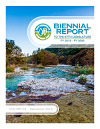Letter from the Commission
Below is the biennial report’s letter from the commissioners, along with the agency mission and philosophy. (Biennial Report to the 87th Legislature, FY2019-FY2020)
It has been an unusual year for the Texas Commission on Environmental Quality, as it has been for all of us.
Looking back on our last biennial report report, it's almost as if we had a glimpse into the future when we closed our letter with these words:
"The TCEQ stands ready to deal with future changes that will undoubtedly come our way and, as always, will apply standards fairly and use sound science to make decisions that are consistent with our mission to protect public health and the environment, while supporting a strong Texas economy."
Although we couldn't have foreseen the harsh realities of living with COVID-19, we have adapted—learning how to work remotely, developing new ways of accomplishing tasks, and providing guidelines for a safe response to the virus that has touched every one of us.
For many positions, teleworking is not a feasible option—we still need to carry out investigations and respond to emergencies and other high-priority events. In response, agency employees from offices around the state began working in shifts to prepare personal protective equipment and sanitizing products for staff whose jobs required them to remain in the field.
Through it all, even during emergency situations, TCEQ employees have continued to work on behalf of all Texans—improving air quality; ensuring adequate, clean drinking water; and working with regulated entities to ensure compliance with our rules.
During the fiscal years of 2019 and 2020, TCEQ responded to numerous disasters, including several chemical fires, a pipeline explosion, and Hurricane Laura. Yes, even during a pandemic.
Two major chemical fires demanded urgent emergency response from TCEQ during 2019. In March, we deployed mobile air monitoring vehicles to Deer Park to combat a fire at Intercontinental Terminals Co.'s bulk petroleum terminal storage and processing center. We dispatched teams of environmental investigators to conduct handheld monitoring of air quality and assessed surface water quality data from the Houston Ship Channel and in Galveston Bay to address releases associated with the incident. A second fire, in November of 2019, required TCEQ to conduct round-the-clock air monitoring for two months following an explosion at Texas Petrochemicals Group's operations in Port Neches. Our equipment provided instantaneous readings for a variety of substances, which we made public through frequent updates on social media and our website.
Hurricane Harvey taught us that you can never be too prepared. With that in mind, TCEQ formulated emergency response plans for air quality monitoring, safe drinking water, critical water infrastructure, wastewater and sewage, and flood water in advance of Hurricane Laura in August 2020. Fortunately, Texas was spared the brunt of the storm's damage, but we were ready.
Earlier the same month, TCEQ quickly marshalled its resources in response to an explosion and fire near Nueces Bay when a barge collided with a pipeline. In addition to supporting first responders and assisting with emergency response to the fire on site, agency personnel mobilized a new Rapid Assessment Monitoring van, outfitted with state-of-the-art technology, to collect air samples in real time and continued to monitor air quality and collect water samples in the aftermath of the accident.
Although disasters tend to garner headlines, TCEQ has been working proactively to improve air quality. The agency's Texas Clean School Bus program made $6.2 million available statewide for school districts, charter schools, and transportation systems to replace or retrofit diesel-fueled school buses. With high demand for cleaner buses, the agency was able to award an additional $2.1 million under the program, for a total of $8.3 million. We also announced up to $12 million in grants for individuals, businesses, and governmental entities to build or expand alternative fueling facilities in Texas, including compressed natural gas and/or liquefied natural gas, propane, biodiesel, methanol, hydrogen, and electricity.
And importantly, TCEQ witnessed several leadership changes during FY 2019-2020, including appointment of a new commissioner, Bobby Janecka, plus the promotion of two new deputy executive directors, L'Oreal Stepney, P.E., and Ramiro Garcia, Jr.
At a time when so many lives have been disrupted by unforeseen events, TCEQ has remained committed to preserving the rich legacy of Texas and the natural wonders we all cherish. We take our responsibility as stewards of the environment seriously and regard our oath to uphold the public trust as an honor and a privilege, no matter the circumstances.
Jon Niermann, Chairman
Emily Lindley, Commissioner
Bobby Janecka, Commissioner
Agency Mission and Philosophy
Mission
The Texas Commission on Environmental Quality strives to protect our state's public health and natural resources consistent with sustainable economic development. Our goal is clean air, clean water, and the safe management of waste.
Philosophy
To accomplish our mission, we will:
- base decisions on the law, common sense, sound science, and fiscal responsibility;
- ensure that regulations are necessary, effective, and current;
- apply regulations clearly and consistently;
- ensure consistent, just, and timely enforcement when environmental laws are violated;
- ensure meaningful public participation in the decision-making process;
- promote and foster voluntary compliance with environmental laws and provide flexibility in achieving environmental goals; and
- hire, develop, and retain a high-quality, diverse workforce.

